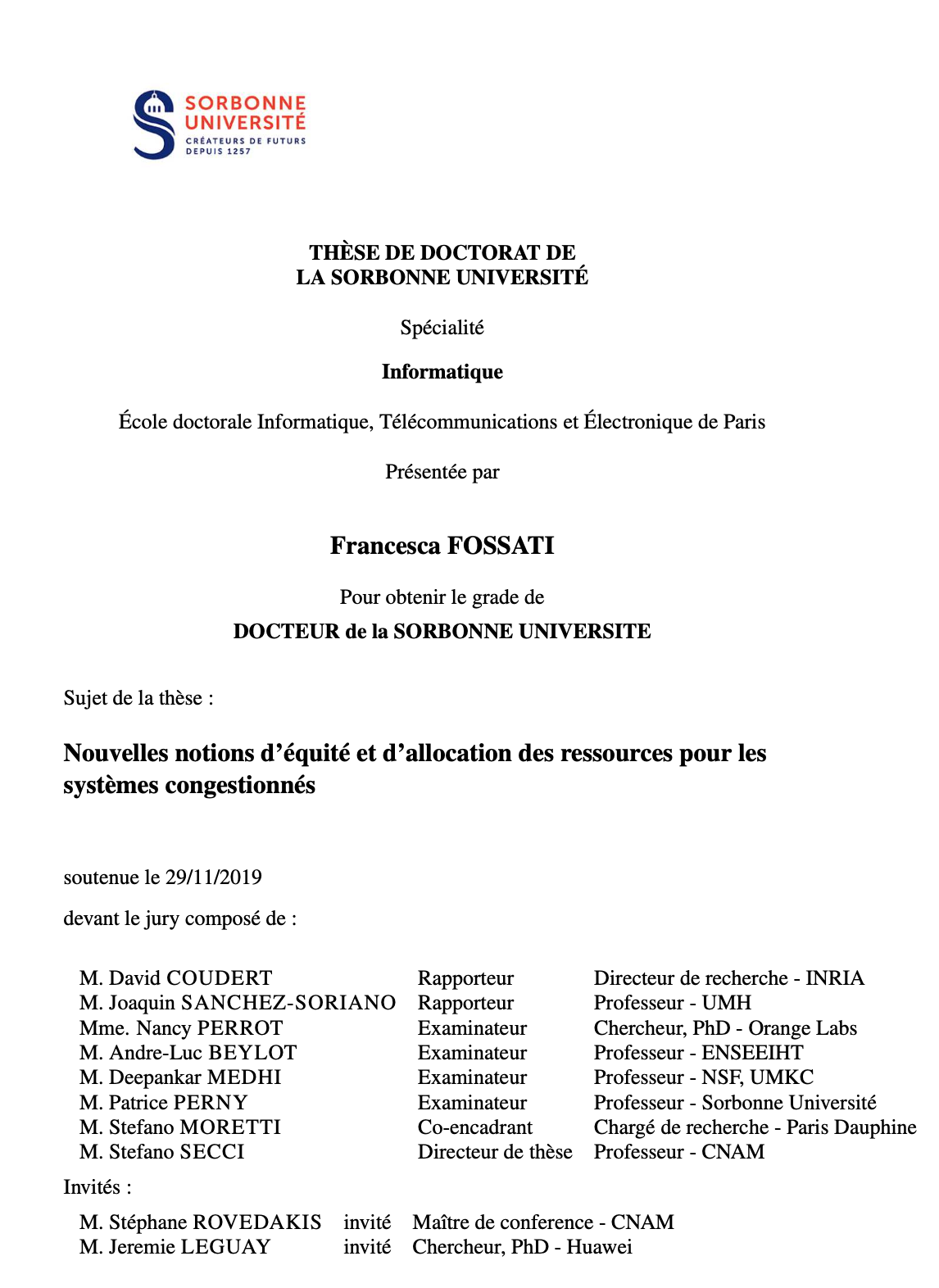Francesca Fossati, Ph.D. student at LIP6, Sorbonne University, under the supervision of Prof. Stefano Secci (CNAM, Paris), will defend her Ph.D. thesis on November 29, 2019, at 14:00 in Room 405, Corridor 24-25, Sorbonne Université, Campus Pierre et Marie Curie, 4 Place Jussieu, 75005 Paris, France.
Thesis Title: Novel notions of fairness and resource allocation for congested networked systems
Thesis Title (French): Nouvelles notions d’équité et d’allocation des ressources pour les systèmes congestionnés

Abstract:
Fairness is a topic that emerges in many fields and that is linked to resource allocation and fair division problems. In networking and computing the legacy approach to solve these situations is to model them as a single-decision maker problem, using classical resource allocation protocols as the proportional rule or the max-min fair allocation. The evolution of telecommunication network technologies, the advances in computing power and in software design practices allow giving a high degree of freedom and programmability to resource allocation and routing decision-making logics. Furthermore, software-defined radio and virtualized network platforms can be used on top of a shared infrastructure making possible a real-time auditability of the system by its tenants and users. Therefore, novel networking contexts such that tenants can be aware of other users’ demands and the available amount of the resource, or they can have a partial information on the system, have to be considered. Moreove, in the decision-making modeling for 5G systems, it is necessary to move from single-resource allocation to multi-resource allocation. In fact, with the introduction of network slicing, we need logically-isolated network partitions that combine network, computation and storage programmable resources. In this thesis we aim to provide a theoretical and formal analysis and redefinition of fairness of resource allocation for congested networked systems, i.e., systems that are in the challenging situation in which resources are limited and not enough to fully satisfy users’ demand. We analyze, propose and evaluate numerically centralized, decentralized, single and multi-resource allocation rules.
Francesca’s publications:
10 documentsJournal articles
- Mahdi Sharara, Francesca Fossati, Sahar Hoteit, Véronique Vèque, Francesca Bassi. Minimizing energy consumption by joint radio and computing resource allocation in Cloud-RAN. Computer Networks, 2023, 234, pp.109870. ⟨10.1016/j.comnet.2023.109870⟩. ⟨hal-04140752⟩
- Francesca Fossati, Stephane Rovedakis, Stefano Secci. Distributed algorithms for multi-resource allocation. IEEE Transactions on Parallel and Distributed Systems, 2022, 33 (10), pp.2524-2539. ⟨10.1109/TPDS.2022.3144376⟩. ⟨hal-03533348⟩
- Francesca Fossati, Stefano Moretti, Patrice Perny, Stefano Secci. Multi-Resource Allocation for Network Slicing. IEEE/ACM Transactions on Networking, 2020, 28 (3), pp.1311-1324. ⟨10.1109/TNET.2020.2979667⟩. ⟨hal-02008115⟩
- Francesca Fossati, Deep Medhi, Stefano Moretti, Stefano Secci. Error Estimate and Fairness in Resource Allocation with Inaccurate Information Sharing. IEEE Networking Letters, 2019, 1 (4), pp.173-177. ⟨10.1109/LNET.2019.2946466⟩. ⟨hal-02311536⟩
- Francesca Fossati, Sahar Hoteit, Stefano Moretti, Stefano Secci. Fair Resource Allocation in Systems with Complete Information Sharing. IEEE/ACM Transactions on Networking, 2018, 26 (6), pp.2801-2814. ⟨10.1109/TNET.2018.2878644⟩. ⟨hal-01910226⟩
Conference papers
- Elif Ebru Ohri, Qi Liao, Anastasios Giovanidis, Francesca Fossati, Nour-El-Houda Yellas. MetaLore: learning to orchestrate communication and computation for metaverse synchronization. IEEE Global Communications Conference (GLOBECOM), Dec 2025, Taipei, Taiwan. ⟨hal-05317622⟩
- Laiza de Lara, Francesca Fossati, Stephane Rovedakis. Robust Multi-Resource Allocation Against Controller Failures in Network Slice Provisioning. 2022 Global Internet (GI) Symposium, Nov 2022, Paris, France. pp.28-33, ⟨10.1109/CloudNet55617.2022.9978814⟩. ⟨hal-03946630⟩
- Francesca Fossati, Stefano Moretti, Stephane Rovedakis, Stefano Secci. Decentralization of 5G slice resource allocation. IEEE/IFIP Network Operations and Management Symposium (NOMS), Apr 2020, Budapest, Hungary. ⟨10.1109/NOMS47738.2020.9110391⟩. ⟨hal-02501918⟩
- Francesca Fossati, Stefano Moretti, Stefano Secci. Multi-Resource Allocation for Network Slicing under Service Level Agreements. 2019 10th International Conference on Networks of the Future (NoF), Oct 2019, Rome, Italy. pp.48-53, ⟨10.1109/NoF47743.2019.9014995⟩. ⟨hal-02496683⟩
- Francesca Fossati, Stefano Moretti, Stefano Secci. A Mood Value for Fair Resource Allocations. IFIP Networking 2017, Jun 2017, Stockholm, Sweden. ⟨10.23919/IFIPNetworking.2017.8264839⟩. ⟨hal-01445492v2⟩
Access Thesis: https://theses.fr/2019SORUS105



